
Quest launches Exercise Referral Standard to rubber stamp successful schemes
Leisure operators offering exercise on referral (EOR) can now have the quality and effectiveness of their schemes validated by Sport England’s Improvement Tool, Quest.
The new Exercise Referral Standard assessment can be taken standalone or as part of Sport England’s Quest assessment process, which is designed to help facilities strengthen their core operational standards, as well as demonstrate the positive impact they have on their local communities.
The Quality Standard for Exercise Referral assessment was originally developed pre-Covid by Right Directions in partnership with Suffolk Public Health, who had, in collaboration with exercise referral scheme leaders, health professionals and other key stakeholders across the county, provided a set of locally tailored operating standards for exercise referral schemes.
The first of its kind in the UK, it was developed to reassure GPs and health professionals that they can refer in the knowledge accredited facilities are successfully delivering programmes that have been rigorously tested using ‘real-world’ criteria. Following a successful two and half year pilot, the Standard has been adapted into a module for Sport England’s Quest.
Phil Lown is a Senior Quest Assessor at Right Directions, which manages Quest on behalf of Sport England as part of Moving Communities. He explains: “The Exercise Referral Standard will allow facilities running exercise on referral schemes to challenge and check the suitability of the programmes they are running, analyse how they are using funding and demonstrate clear patient outputs. This ‘rubber stamp’ should also give operators the confidence to apply for further funding.
“Health professionals will no longer need to find solutions to embed exercise themselves; they can simply refer patients living with a condition that would benefit from physical activity to facilities that have achieved the Exercise Referral Standard, reassured they will receive a high standard of care and a structured exercise programme delivered in a safe environment.”
The Standard aims to ensure exercise referral schemes are operating in line with the 2014 National Institute for Health and Care Excellence (NICE) guidelines for exercise referral and behaviour change, and that pathways are in place for exercise referral aligned to evidence-based principles and best practice guidelines; as well as local health and wellbeing priorities.
“The Standard isn’t limited to those offering exercise referral in a leisure centre. It’s ideal for small, specialist community teams and exercise referral-specific projects, as well as specialist exercise referral teams who operate as independent teams within the community or within a leisure facility setting,” explains Lown.
The assessment can be carried out as a stand-alone accreditation or on day two as part of Quest Plus at no extra cost, and covers all elements of exercise referral across four key areas: scheme safety, scheme delivery (including governance), information sharing and scheme monitoring and evaluation. It includes observation of a practical exercise referral session, which could be anything from a specialist programme review or initial consultation to an exercise class, group gym session or induction.
Lown concludes: “Achieving this exercise referral stamp of approval will help facilities grow their programmes by facilitating understanding of local referral processes, strengthening the local evidence-base on the effectiveness of schemes and therefore their case for accessing funding streams.
“Ultimately, it should ensure residents receive high-quality exercise programmes tailored to their needs and make it easier for healthcare professionals to engage with schemes and for individuals to participate.”
Putting into practice
Matthew Hickey is Health and Well-being Manager at Abbeycroft Leisure, and was involved in the original development of the Quality Standard. He explains: “We’ve had programmes running for 12 years now. They were originally self-funded by the client and some GPs and community teams were happy to refer into a paid service.
“However, the introduction of the Standard has really joined the dots; providing us with the structure and credibility to move forward at pace. We now offer funded patient pathways, supported by Suffolk County Council Public Health, West Suffolk NHS Foundation Trust, West Suffolk Council and the wider West Suffolk Alliance – all the local health bodies working together to support our work, simply because we are now a trusted partner.
“We use the Exercise Referral Standard and Refer-All’s software to demonstrate the outcomes of our Active Living programmes, which now run across seven localities, and we have secured an additional two years of funding. Plus, now our foot’s in the door, we can keep it open, as we’re front and centre of partners’ thinking when it comes to anything else. We’re having new conversations every week and have received further funding for long Covid support and working with MacMillan on cancer programmes.
“Due to Abbeycroft Leisure’s growth in recent years, we now manage twelve centres on behalf of our local council partners and we’re able to use the Standard as a base point to externally assess and align all exercise on referral programmes across our portfolio. From the evaluation and feedback we can understand why one element scores an ‘excellent’ and another only ‘good’, recognise where there are gaps in knowledge and create a structure to put any necessary changes into place, continually testing what we are doing to ensure it’s still working effectively.”


Sorry, the comment form is closed at this time.